
Over time, small habits compound. This means that a very small habit or action, performed daily, can add up to massive results over time. Are you ready to learn how you can make small daily changes that will add up to life-altering transformations? In this article, we are going to dive into the compound effect, the compound effect of small habits, and how you can use the compound effect of small habits to change your life. Keep reading to learn more!
What Is The Compound Effect?
The compound effect is the method of reaping massive rewards from small actions or habits.
The Compound Effect Of Small Habits
The compound effect is most often applied to small habits or actions. So the compound effect of small habits means that you reap massive rewards because of the small habits you are performing.
“Making a choice that is 1 percent better or 1 percent worse seems insignificant in the moment, but over the span of moments that make up a lifetime these choices determine the difference between who you are and who you could be. Success is the product of daily habits – not once-in-a-lifetime transformations.”
– James Clear
10 Small Habits That Will Change Your Life
How can you change your life with the compound effect of small habits? Here are 10 examples to get you started.
1. Read 10 pages of a book per day.
Reading 10 pages of a book per day won’t take too long and can have a massive output. 10 pages per day comes out to 300 pages and about 2-3 books per month. Talk about a small change that would add up quickly! 2 books per month is 24 books per year!
Related post:
5 Self-Improvement Books That Changed My Life
2. Go to bed 30 minutes earlier.
Going to bed 30 minutes earlier per night also adds up! 30 minutes extra per night is an extra 3.5 hours of sleep per week! If you need help remembering to get to bed earlier, try setting an alarm on your phone. This will serve as a reminder to get in bed earlier than normal.
3. Meditate for 15 minutes per day.
Everyone can carve out 15 minutes per day! This could even be while you’re winding down for bed each night. Meditation is a powerful tool and the benefits only get better over time. Here are some of the benefits you could see from meditating daily: improved memory, reduced stress, reduced anxiety, enhanced self-awareness, improved attention span, and more!
4. Park In The Furthest Spot From The Store/Work
Park as far away as possible when shopping, going to work, etc. Those extra steps add up! Over time, these extra steps will continue to compound! Challenge yourself and see how many extra steps and miles you can put on simply by parking further away.
5. Start Intermittent Fasting
Intermittent fasting is a simple habit that compounds over time. Intermittent fasting is eating within a certain window of time and then fasting (not eating) during a certain period of time. One common intermittent fasting method is 16:8. This means that you fast for 16 hours and eat for 8 hours. Many people choose to eat from 12 pm – 8 pm, just skipping breakfast.
Once you get started, intermittent fasting is simple and the results and benefits compound over time. On a daily basis, you just eat less. But over time, you can see countless benefits from intermittent fasting including: weight loss, reduced inflammation, insulin resistance, heart health benefits, cellular repair, anti-aging, boosted cognitive function, and more.
SAVE FOR LATER 🙂
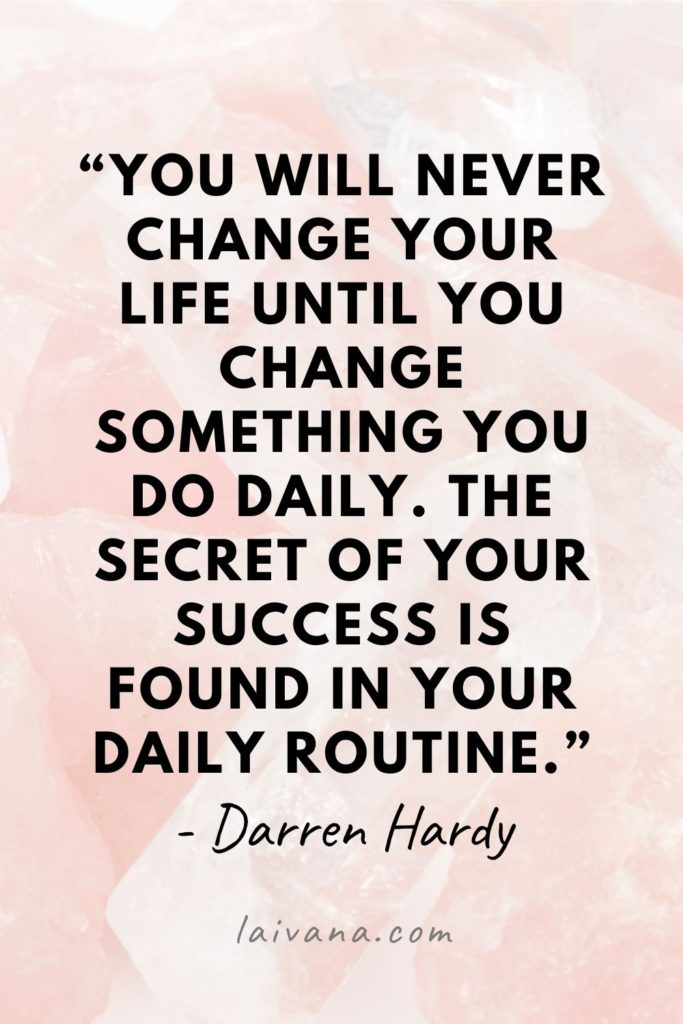
6. Add Daily Movement
Daily movement isn’t just for weight loss or looking good – daily movement is crucial for maintaining a healthy body! Walking for just 30 minutes per day has been shown to increase cardiovascular fitness, reduce excess body fat and boost endurance. It can also reduce your risk of developing heart disease, type 2 diabetes, osteoporosis, and even some types of cancer.
7. Save Money
Saving a little money per day adds up and compounds! You could save money by not eating out or actually stick a little money aside in a savings account to watch it grow. Saving $1 per day would be an extra $365 at the end of the year!
8. Start Journaling
Journaling has been shown to help you reach your goals, improve your communication skills, strengthen your memory, and more! A little journaling daily compounds! You could choose to journal about how you are feeling, what happened during your day, what you’re doing to achieve your goals, etc. You could also write out affirmations that resonate with you.
Free downloads:
70+ Journal Prompts for Creating a Life You Want
111 Empowering Affirmations to Build Confidence and Improve Your Life
9. Take Cold Showers
There are so many benefits of taking cold showers! But just like these other habits, the benefits add up and compound over time. Here are a few benefits of taking cold showers: reduced stress levels, more robust immune response, higher levels of alertness, and increased willpower.
10. Cooking Meals At Home
If you start to cook most of your meals at home, you save money and you are likely to eat healthier. Saving money and eating healthier will continue to compound over time! You may even learn how to cook and prepare new foods by spending more time in the kitchen!
SAVE FOR LATER 🙂
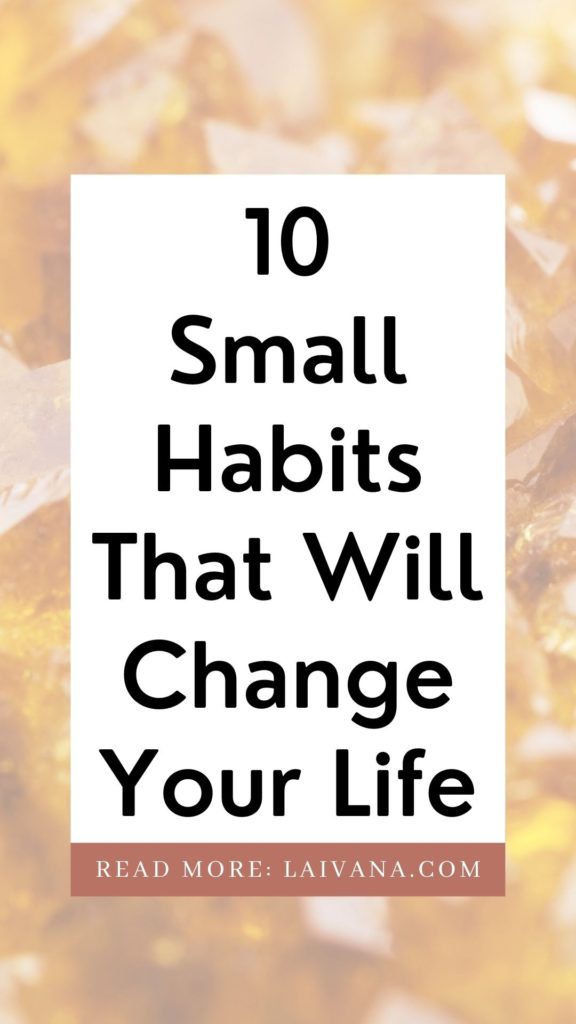
How To Use The Compound Effect Of Small Habits In Your Life
Now that we understand the compound effect of small habits and have seen some examples, how can you implement it in your life? Here are a few tips to help you out.
Examine Your Habits
Do you have habits that you want to break or improve? Examine your current habits and see where you can implement positive, small habit changes.
For example, if you sit down every night and flip on Netflix, but you want to read more, set a timer and watch Netflix for 30 minutes. Then, pull out a book and read. If you have a daily page goal or a daily goal of how long to read – accomplish that. Then you can turn Netflix back on if you desire.
Examining your habits and adding positive changes can improve your life, without making drastic changes. Notice, there wasn’t a suggestion to stop watching Netflix. That would be drastic and likely very challenging. Instead, you are adding a small, positive change that will compound over time.
Break It Down
Break your goals down. If your goal is to lose weight, break that goal down into smaller pieces. For example, if you want to lose 50 pounds, maybe you can commit to losing 1 pound per week. Now that you have a smaller, more bite-sized goal, it’s time to look at the small habits or actions you can take to achieve your goal.
Maybe it’s choosing to only eat out one time per week. If you’re currently eating out 4 times per week, cutting down to one meal out will drastically compound over time.
No matter what your goal is, break it down into a smaller piece and determine which positive, small habit you can implement to help you achieve your goal.
>> Want to learn how to break down your goals by using the reverse-engineering method? Listen to episode 59 of The La Ivana Podcast to learn the step-by-step process to reverse-engineer your goals for success.
Be Consistent
When you take small, daily action – your habits compound. But, in order for them to compound, you have to be consistent. You have to put in the small, minuscule habit every day in order for it to add up. Put in the consistent work and you will be rewarded.
For example, if you save $10 per day, you will have $3,650 in one year. If you continue to save $10 per day, you will have $18,250 in 5 years. On the contrary, if you save for one week and then stop saving, your habit (in this case, money) will not continue to compound.
Related resources:
3 Powerful Ways to Stay Committed to Your Goals
EP24: 3 Ways to Continuously Make Progress on Your Goals
Add It To Your Schedule
Add your new habit to your schedule. If you want to be more active, put it on your schedule and add it to your day. Create appointments with yourself and actually show up. You wouldn’t skip out on a commitment with your boss, would you? Don’t miss the appointments you schedule for yourself!
An example of this would be adding your workout to your calendar. Create an actual appointment for yourself and set a reminder. When the alert pops up, stay true to yourself and go to your workout appointment!
Find Your Tribe
Did you know that you are the average of the 5 people you spend the most time with? Who are you spending your time with? How are those people impacting you? If the people you spend time with aren’t encouraging you to improve your life, you may want to reevaluate who you are hanging out with.
Find your tribe of people that take action to better their lives. If you want to go to the gym more, find a friend or group of people who already have a habit of going to the gym. In turn, this helps you achieve your goal and you are associating yourself with others who already have this habit established.
Reward Yourself
Reward yourself for being consistent with new habits. Rewarding yourself doesn’t have to be expensive or counterintuitive to your goals. Your reward could be a long bubble bath or treating yourself to a pedicure. Set a goal to be consistent for a month, then reward yourself. Continue to reward yourself as you continue to follow through with your small habits.
Track Your Progress
On a daily basis, it may seem like one workout or one cold shower isn’t improving your life. But take note of your progress month to month and year to year. As you have read, these small habits truly will compound and make a difference.
You can track your progress by journaling and sharing your thoughts, your skill levels, etc. If you have physical goals or weight loss goals, you could also track with the help of measurements and progress pictures.
SAVE FOR LATER 🙂
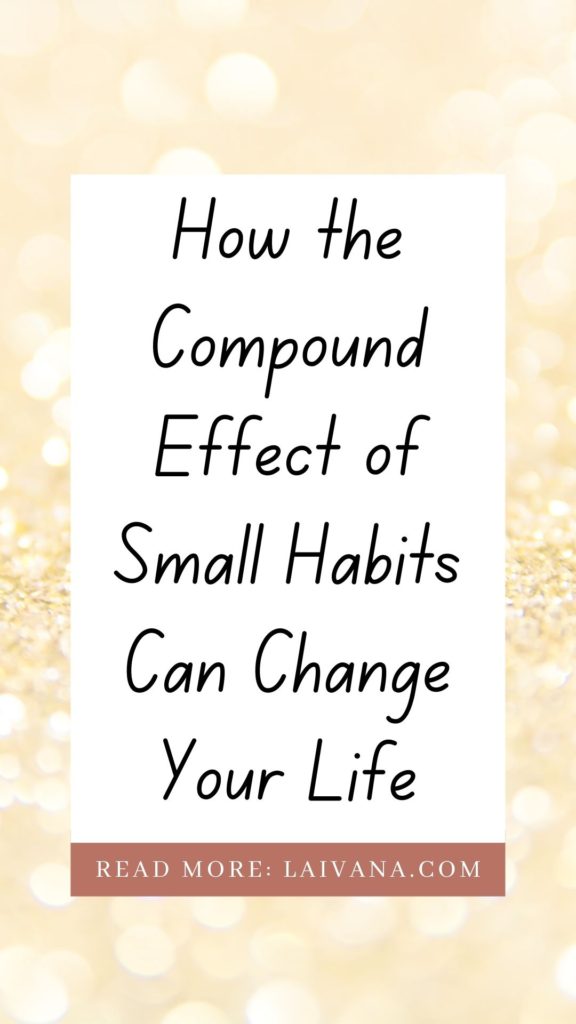
The Compound Effect Of Small Habits – Both Positive And Negative
The compound effect of small habits is truly amazing when it is used positively. So far, we have walked through how to create small, positive habits that will add up to big, happy, life-altering changes.
Unfortunately, the compound effect of small habits can also work negatively. For example, if you exceed your calorie intake by 100 calories per day, you will gain a pound in 35 days. A pound isn’t much, but if you continue that habit, you will be 10 pounds heavier at the end of the year.
There are many other negative habits that this could apply to. Now that you know that both positive and negative habits compound, it would be advantageous to review all of your current habits. What good habits do you have? What poor habits do you have? What neutral habits do you have?
Now that you have recognized your habits, use the good or neutral habits you already have to help you create new, positive habits. James Clear refers to this as habit stacking. For example, every single day, you likely brush your teeth. This is a habit. What could you do immediately after you brush your teeth? Could you add a positive habit here? That way, when you brush your teeth daily, you immediately stack that habit with a new habit. By stacking a new habit with a habit that you already do, this increases the odds of you completing the new habit.
Final Thoughts
“When you improve a little each day, eventually big things occur. When you improve conditioning a little each day, eventually you have a big improvement in conditioning. Not tomorrow, not the next day, but eventually a big gain is made. Don’t look for the big, quick improvement. Seek the small improvement one day at a time. That’s the only way it happens — and when it happens, it lasts.” – John Wooden
Is the concept of the compound effect of small habits new to you? It’s truly amazing how small habits and actions compound over time. Hopefully you have learned something new that you can apply to your life to reap massive results.
What positive small habits do you plan to implement after reading this article?
GUEST CONTRIBUTOR:
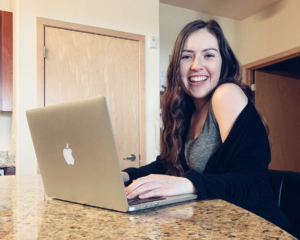
Macy Sarbacker is a personal trainer, wellness expert and Executive Editor at the Macy Michelle Blog. Macy lives in Wisconsin with her fiance and fur-baby.
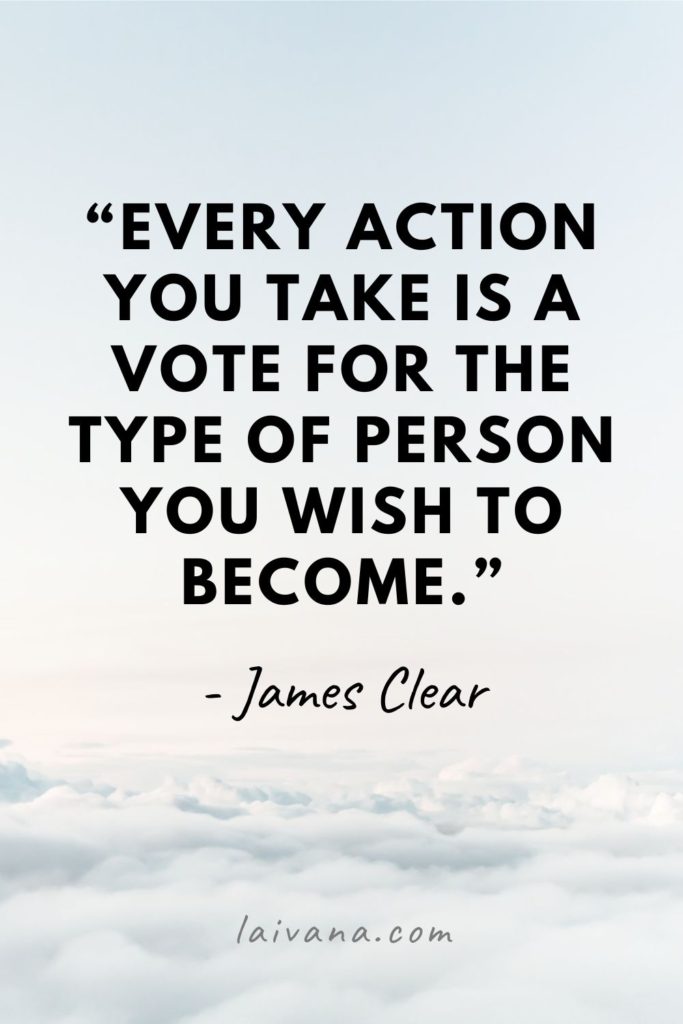
habits personal growth the compound effect the cumulative effect



I love this post! The ideas here are great! I personally struggle with the cold shower one, lol. Thanks for sharing!
This is awesome and super useful. I love how actionable your advice is here. Small habits for the win!
Personally, I feel like this would be so hard because I don’t have that personal drive to get things accomplished. I feel like, if I had that drive, then the idea of the compounding effect would be much greater for my life. But, it’s all too easy to watch TV for 30 minutes, turn off the alarm for “time to read” and go back to the TV because it’s so much more interesting than what I might have chosen to read that night. Does that make sense? I like the concept of habit stacking, and I feel like that would be a good way for me to start creating new habits, as long as they coincide with the habit that I’m already following. I have definitely seen where cooking at home can be a life saver, as well as a money saver, and have tried to consistently add that into my life. It’s easier said than done, but can speak to the success of money saving once that becomes a routine in someone’s life. I guess, sometimes, I feel like there are so many habits that need to change in my life, and so many that need to be added, that I am too overwhelmed with them all and end up giving up before I really start.
This post is so rich in ideas! I love it. I definitely agree that smaller actions, turned into habits, can make a big difference in the long run. Reading 10 pages a day is better than not reading at all! Yes. What I want to try in my everyday life is meditating/doing yoga at least ten minutes every evening.
Thank you for the motivation! 🙂
Julia x
These are all great ideas! I love this idea and have applied it to blogging and reading. I need to start going to bed earlier and parking farther away.